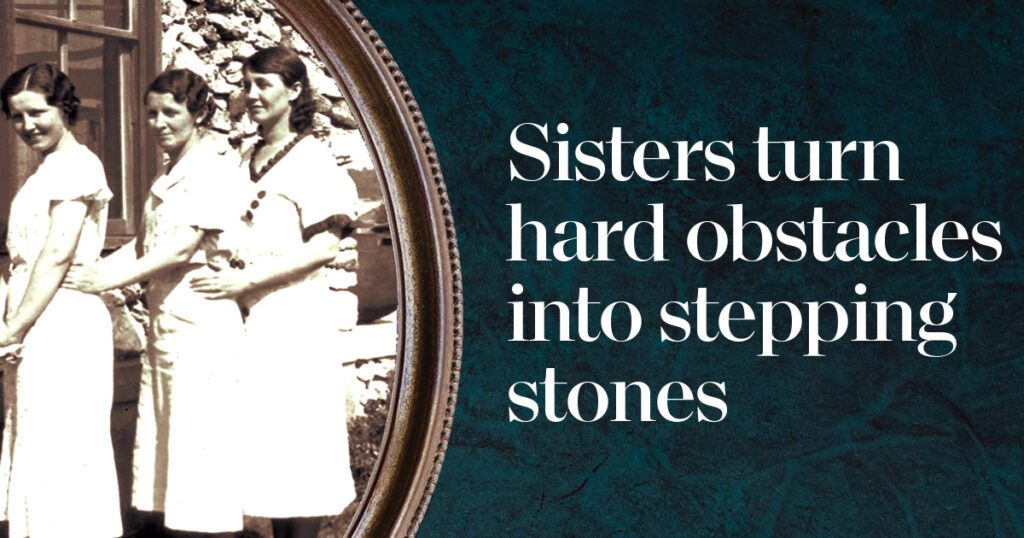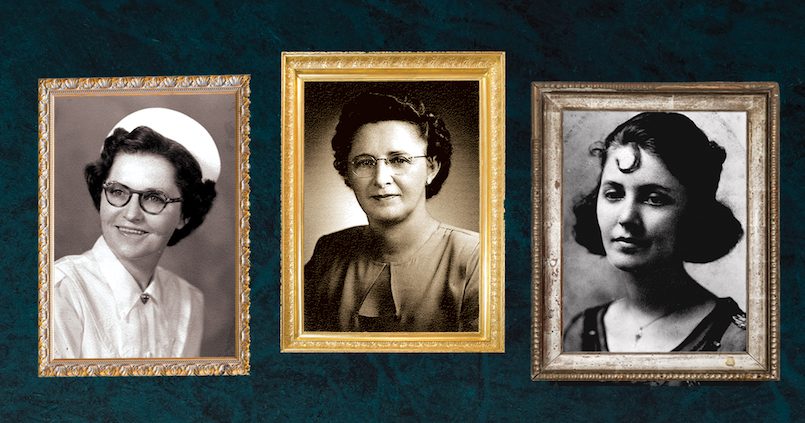02 May 2023 Sisters turn hard obstacles into stepping stones
By Vivian Lawson Hogue
Except for the bullfrogs’ percussion section and cows harmonizing their “moo-zic” with tree frogs trilling in the oak trees, one very small town near Arkansas’s Spring River was the otherwise quiet site of my maternal grandparents’ home. I would say their still-standing house will be forever safe from destructive winds. My granddad built the structure himself with cement walls and floors and an exterior of rocks from the local quarry. The fireplace was perhaps large enough to have an echo. A rock-sided drilled well with a cylinder bucket was outside the kitchen. My Arnold grandparents and family lived much of their lives in that house.
An outhouse stood at the back of the large lot, so by the time you reached its door, you almost forgot your intentions. Behind the outhouse was the Methodist church’s cemetery, so you hastily walked back after fulfilling your intentions, yet looking around for recuperated “haints” (ghosts).

Grandmother birthed nine children. The first living child leading the pack in 1901 was my mother, Bessie Vivian. After becoming a competent age, Mother helped Granddad with farm chores as the boys were too young. In adulthood, Mother moved to Conway in 1935 with her own family. Her career was helping raise five children to be three physicians and two teachers. And the financial effects were many dinners and suppers of cornbread and soup!
Daughter No. 2 was Zula Greenfield. Aunt Zula played rolling chords accompanied by her not-terribly-melodic singing. I once asked Aunt Zula how she got her middle name. She said she didn’t know. According to our family tree, I now know that the name’s origin was her great-grandmother’s maiden name, which I traced to my ninth great-grandfather born in 1531.
The third daughter was Annie Jane, the one awarded the first name of her Grandmother Noel. A nice two-part Southern name eventually became “Jane.” She and her two sisters were good cooks, meticulous seamstresses and pianists.
The two boys, William Everett and Kirby Edmond, were herded by their sisters bearing comparison to keen-eyed border collies. Uncle Bill likely had the ancestral name of William. We don’t know from whom he got his very tall stature or how he could kick his foot up and touch a doorway’s top jamb. Uncle Kirby died at age 34 the day before his marriage so I never knew him. My grandparents also had two stillborns; one child died at age 2 and one at 20 days. Four out of nine survived, but Grandmother was forever affected.
The three sisters did not look or act alike, nor did the brothers. My mother was quiet but displayed style and social graces although she might have just repaired cattle fencing. She sewed without patterns, quilted and made lace. She said all five children would walk down the church aisle on Sundays displaying their Scots/Irish heritage, one with black hair, one red, one brown, one auburn and one cotton-headed.

As adults, there were even more differences. Aunt Zula was a teacher for 40 years, earning her degree by spending summers with us while walking to college every day. As a teacher, she fed children who had little to eat and bought clothes and shoes for those who wore the same clothing every day. She enjoyed pranks played on her and relished shocking others with her antics. She had a prosthetic eye lost from cancer and false teeth, which she delighted in popping out for my children. Had she performed with her eye, we would have had to talk.
Uncle Bill married Margaret, a gracious lady with a syrupy Georgian drawl who pronounced her name “Mah-grit.” Besides his height and door-frame kicking ability, his robust laugh could likely be heard downtown even with all the cotton gins and the Conway Corporation generator running. While a Coast Guardsman in World War II, he sent home a shipboard photo of his new beard. His hair was auburn, and his ample beard was bright red.
Aunt Jane was a devout Christian with an enthusiastic, sometimes mischievous smile. I think she must have been memorizing the Bible all her life. That was fortunate for a rough and challenging marriage leading to becoming a single mother. By determination, she became a nurse, helping to heal people medically and spiritually.
These Wonder Women never let something beneficial escape. Aunt Jane, her son and Aunt Zula and others were at our home at the same time one Christmas Eve and empty beds were scarce. Aunt Jane said, “Well, Vivian and I will just sleep on the living room floor!” I was unexpectedly volunteered, but we made our nests and started chatting.
She began telling my 12-year-old self about her early church days in the hills of Arkansas and beyond, and she asked,” So are you saved?” I had to admit that I didn’t know what that meant nor had I ever read the Bible. She didn’t even gasp, but proceeded to tell me what I should know. In fact, the saved part didn’t happen for 20 years, but she must have planted a Matthew 17 mustard seed for me! When the seed came up, it was a spindly, wobbly sprout that needed and received water. Many more years later, I experienced baptism in 2021. Even gnarly old plants can need and receive reviving water.
- Salute to service - June 30, 2024
- One man plus One idea equals a 149-year-old city - June 2, 2024
- A look back at the forgotten women of the 501 - April 30, 2024











